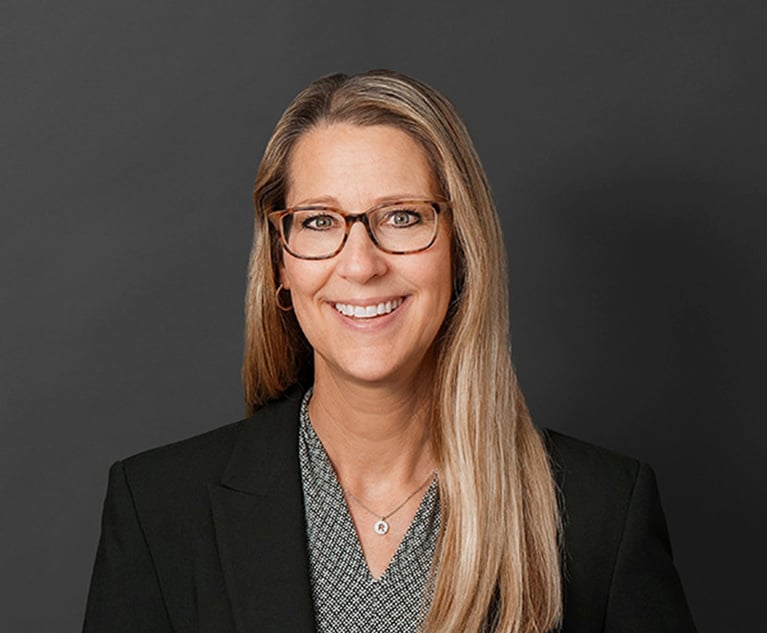'Frye' Test, Mental Health Professionals' Duty to Warn Highlight SCOPA Arguments
A full complement of the Pennsylvania Supreme Court is set to begin its two-day argument session Tuesday. Eleven cases are scheduled for argument.
October 09, 2019 at 12:41 PM
5 minute read
 Pittsburgh, Pennsylvania. (Photo: ESB Professional/shutterstock)
Pittsburgh, Pennsylvania. (Photo: ESB Professional/shutterstock)
The Pennsylvania Supreme Court is set to hear arguments in Pittsburgh on a variety of topics, including what role trial courts can play when evaluating experts under the Frye standard, and whether mental health professionals have a duty to warn of threats against a group of unspecified individuals.
A full complement of the Supreme Court is set to begin its two-day argument session Tuesday. Eleven cases are scheduled for argument.
'Frye' Test
One of the more closely watched cases the justices are set to hear is Walsh v. BASF, which hinges on questions about whether a trial court went too far in evaluating the basis for an expert's opinion as part of a Frye inquiry.
The state Superior Court said that the trial judge had gone too far, and held the lower court should not have evaluated the source materials that an expert used to support his opinion on causation.
The case stems from the death of Thomas Walsh, a man who worked as a groundskeeper for 40 years before he developed acute myelogenous leukemia. After Walsh died in 2009, his estate sued, alleging exposure to insecticides and fungicides that he regularly came into contact with caused his cancer. During the litigation, the defendants filed motions seeking to exclude the plaintiff's epidemiologist and physician under the test outlined in Frye v. United States, which is used to evaluate whether an expert should be able to testify about new forms of scientific evidence.
The trial court granted the motion, and the case was dismissed on summary judgment.
The Superior Court reversed, noting Frye should be used only to determine whether the scientific community has generally accepted an expert's principals and methodology, and should not evaluate the expert's conclusions.
"The fact that the experts arrive at different conclusions goes to the weight of the evidence, not its admissibility," Superior Court Judge Mary Jane Bowes said in her opinion for the court. "The court looked behind [the expert's] differential diagnosis methodology and challenged his conclusions."
The Supreme Court agreed to take up the case in March, to specifically determine whether the Superior Court erred in holding that "trial courts are not permitted to act as 'gatekeepers.'"
The case is set to be argued Wednesday.
Judge's Absence
On Tuesday, the justices are set to hear arguments over whether the Superior Court was required to defer to a trial judge's decision not to strike a juror in a medical malpractice case, despite the fact that the judge was absent from the room when the prospective jurors were questioned.
A three-judge Superior Court panel consisting of Judges Bowes, Judith Olson and Deborah A. Kunselman granted plaintiff Mendy Trigg a new trial. It reversed an Allegheny County jury's verdict in favor of the Children's Hospital of Pittsburgh of UPMC, after Trigg argued that the selected jurors were biased.
The issue centered on the absence of the Allegheny County judge during voir dire, and a lack of any firsthand observation of the jurors' demeanor during that process.
Trigg argued that the lack of judicial supervision allowed biased jurors to slip through the cracks, but the hospital maintained the issue was a "red herring."
In its one-page order granting allocatur, the Supreme Court agreed to hear argument on whether the Superior Court failed to defer to the trial court, whether the ruling conflicted with case law about when jurors can be struck, and if the intermediate appellate court improperly considered waived arguments about a juror's demeanor.
Duty to Warn
The first case the justices are scheduled to hear Wednesday deals with mental health professionals' duty to warn about threats.
In Maas v. UPMC Presbyterian Shadyside, a three-judge panel of the state Superior Court ruled last June that the defendants—UPMC Presbyterian Shadyside, which does business as Western Psychiatric Institute and Clinic; Western Psychiatric Institute and Clinic; Dr. Michelle Barwell; and Western Psychiatric Institute and Clinic Adult Community Treatment Team—had a duty to warn the neighbors of a mentally ill patient that he had threatened to kill one of them, even though he hadn't specified which one.
The patient, Terrence Andrews, attacked and killed Lisa Maas, who lived four doors down in the same western Pennsylvania apartment complex, just days after informing the defendants of homicidal ideations against one of his neighbors, according to the Superior Court panel's opinion, issued June 29, 2018. Maas died as a result of multiple stab wounds from scissors. Andrews had previously revealed during an ER visit to WPIC that he planned to kill one of his neighbors in that manner.
Maas' mother, Laura Maas, acting as administratrix of her daughter's estate, filed suit. She argued the defendants had a duty to warn Andrews' neighbors about the threats he had made during several ER visits and phone contacts with the health care provider.
An Allegheny County trial judge found—and the Superior Court agreed—that a reasonable jury could find that "the tenants residing on Andrews' floor in Hampshire Hall were a readily identifiable group of people to whom [the UPMC] defendants owed a duty to warn."
This content has been archived. It is available through our partners, LexisNexis® and Bloomberg Law.
To view this content, please continue to their sites.
Not a Lexis Subscriber?
Subscribe Now
Not a Bloomberg Law Subscriber?
Subscribe Now
NOT FOR REPRINT
© 2025 ALM Global, LLC, All Rights Reserved. Request academic re-use from www.copyright.com. All other uses, submit a request to [email protected]. For more information visit Asset & Logo Licensing.
You Might Like
View All


Trending Stories
- 1Family Court 2024 Roundup: Part I
- 2In-House Lawyers Are Focused on Employment and Cybersecurity Disputes, But Looking Out for Conflict Over AI
- 3A Simple 'Trial Lawyer' Goes to the Supreme Court
- 4Clifford Chance Adds Skadden Rainmaker in London
- 5Latham, Kirkland and Paul Weiss Climb UK M&A Rankings
Who Got The Work
J. Brugh Lower of Gibbons has entered an appearance for industrial equipment supplier Devco Corporation in a pending trademark infringement lawsuit. The suit, accusing the defendant of selling knock-off Graco products, was filed Dec. 18 in New Jersey District Court by Rivkin Radler on behalf of Graco Inc. and Graco Minnesota. The case, assigned to U.S. District Judge Zahid N. Quraishi, is 3:24-cv-11294, Graco Inc. et al v. Devco Corporation.
Who Got The Work
Rebecca Maller-Stein and Kent A. Yalowitz of Arnold & Porter Kaye Scholer have entered their appearances for Hanaco Venture Capital and its executives, Lior Prosor and David Frankel, in a pending securities lawsuit. The action, filed on Dec. 24 in New York Southern District Court by Zell, Aron & Co. on behalf of Goldeneye Advisors, accuses the defendants of negligently and fraudulently managing the plaintiff's $1 million investment. The case, assigned to U.S. District Judge Vernon S. Broderick, is 1:24-cv-09918, Goldeneye Advisors, LLC v. Hanaco Venture Capital, Ltd. et al.
Who Got The Work
Attorneys from A&O Shearman has stepped in as defense counsel for Toronto-Dominion Bank and other defendants in a pending securities class action. The suit, filed Dec. 11 in New York Southern District Court by Bleichmar Fonti & Auld, accuses the defendants of concealing the bank's 'pervasive' deficiencies in regards to its compliance with the Bank Secrecy Act and the quality of its anti-money laundering controls. The case, assigned to U.S. District Judge Arun Subramanian, is 1:24-cv-09445, Gonzalez v. The Toronto-Dominion Bank et al.
Who Got The Work
Crown Castle International, a Pennsylvania company providing shared communications infrastructure, has turned to Luke D. Wolf of Gordon Rees Scully Mansukhani to fend off a pending breach-of-contract lawsuit. The court action, filed Nov. 25 in Michigan Eastern District Court by Hooper Hathaway PC on behalf of The Town Residences LLC, accuses Crown Castle of failing to transfer approximately $30,000 in utility payments from T-Mobile in breach of a roof-top lease and assignment agreement. The case, assigned to U.S. District Judge Susan K. Declercq, is 2:24-cv-13131, The Town Residences LLC v. T-Mobile US, Inc. et al.
Who Got The Work
Wilfred P. Coronato and Daniel M. Schwartz of McCarter & English have stepped in as defense counsel to Electrolux Home Products Inc. in a pending product liability lawsuit. The court action, filed Nov. 26 in New York Eastern District Court by Poulos Lopiccolo PC and Nagel Rice LLP on behalf of David Stern, alleges that the defendant's refrigerators’ drawers and shelving repeatedly break and fall apart within months after purchase. The case, assigned to U.S. District Judge Joan M. Azrack, is 2:24-cv-08204, Stern v. Electrolux Home Products, Inc.
Featured Firms
Law Offices of Gary Martin Hays & Associates, P.C.
(470) 294-1674
Law Offices of Mark E. Salomone
(857) 444-6468
Smith & Hassler
(713) 739-1250






